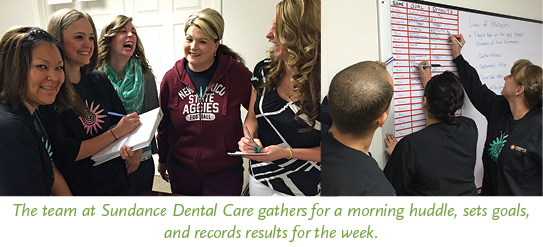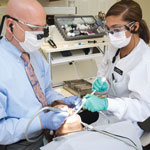
TACKLE THE PROBLEM OF PATIENT TRANSITIONS.
The date is January 17, 1988. The Cleveland Browns and Denver Broncos face each other on the Denver eight-yard line. It’s the AFC Championship game and only 1:12 minutes remain on the clock. If the Browns can make a touchdown, they will tie the game. Tensions are high. The fans scream and cheer wildly from the stands. The coaches pace back and forth on the sidelines and strategize their next move.
Suddenly, the play is set in motion. The center snaps the ball. Bernie Kosar, the Browns’ quarterback, hands it off to running back Earnest Byner. Clutching the ball closely to his side, Byner weaves his way through the mass of players and runs unobstructed towards the end zone.
At the two-yard line, with the goal line easily in sight, the ball is suddenly knocked out of Byner’s grasp by Broncos’ defensive back Jeremiah Castille. At that crucial moment, Byner fumbles the ball.
Unfortunately, he isn’t quick enough to recover it, but the Broncos are. With the ball now in Broncos’ possession and hardly any time left on the clock, the end of the game is determined.
This famous fumble, now known as “The Fumble,” cost the Browns the game and the opportunity to advance to the Super Bowl.
The interesting part of the story, however, isn’t solely the fact that Byner lost control of the ball and fumbled it. It’s the fact that the fumble wasn’t entirely his fault. The Browns’ wide receiver, Webster Slaughter, had a job to do and he failed to do it. He was supposed to block Castille and prevent him from getting to Byner. After viewing the tapes, the coach later remarked that Slaughter chose to just watch the play instead of doing his job.
One team member’s mistake can indeed cause a rippling effect for the entire team and the ultimate victory or loss of the game. Every member of a football team has an important role to play in the team’s success or failure.
Dentistry is Just Like Football
Teamwork (and individual responsibility) is key to the success of any great football team. Likewise, it’s also the key to success for any great dental team. In a dental practice, the dentist plays the dual roles of both coach and quarterback and the rest of the staff are the team’s key players. At any given moment—depending on the needs of the patient and the treatment required—a team member can have the responsibility of taking the patient to the next step in their overall treatment plan.
Just as a handoff by the quarterback in a football game is crucial, a “patient handoff” moment is of the utmost importance to the overall success of the practice. The example of wide receiver Webster Slaughter in the AFC Championship game reminds us that there can’t be any spectators on a winning team. If every team member in a dental practice doesn’t remember and properly perform their duties during the handoff of a patient, a dreaded fumble can and will occur.
An Unfortunate Fumble
I first made this correlation with football and dentistry when I witnessed an unfortunate fumble in my own practice. I had just finished consulting with a patient named “Judy” (name has been changed), who needed a six-unit bridge. We completed a white wax-up with the lab and Judy was excited about the treatment options that I presented. She was anxious to move forward immediately. When I finished my consult with Judy, I “handed her off” to one of my financial coordinators and moved on to another patient. I assumed they discussed finances, since that is the role of a financial coordinator. Judy made a follow-up appointment and returned the next week.
I prepared the bridge for the teeth (numbers 22 through 27) and installed the temporary fixed partial denture. Judy left the appointment and was delighted with her temporary smile. Later, I looked at Judy’s ledger on Dentrix. At that moment, I realized that the ball had been fumbled during Judy’s treatment. There was no record of payment for Judy, even though she should have paid a significant portion either prior to treatment or on the day of treatment. I immediately spoke to my financial coordinator and learned that no financial arrangements were made, even though they should have been made, according to our policies. The ball was fumbled.
Since Judy hadn’t been prepped on what to prepare for financially, she didn’t have a lump sum of money to pay for treatment. Therefore, in contrast to our office protocol, we setup an in-house payment plan for Judy. Typically, we require the patient to acquire funds through personal resources or financing prior to treatment. This fumble placed the practice (and Judy) in a very awkward position. It’s much more professional to discuss fees and financing prior to work being done, rather than afterwards.
As the ‘receiver’ for the play, the financial coordinator had a major role in this fumble—she knew it and felt badly about it. In this particular situation, I was playing the role of the quarterback. I handed off the ball. I assumed that the financial coordinator would run it in for a touchdown, or rather, arrange financing with the patient. Yet, that is not what happened. The financial coordinator didn’t complete her responsibilities and therefore, the play was not completed.
Did the financial coordinator make a mistake? Yes.
Was the ball fumbled? Yes.
Was the game lost? No.
In this situation, there was a way for us to recover the ball. Even though it wasn’t an ideal situation, we worked things out with Judy and received all the payments over a predetermined payment period of time. We were also able to turn this situation into one of learning and growth for our office so that we could better ensure that a similar fumble would be less likely to occur in the future.
Practicing the Plays
In football, the coach and quarterback don’t just briefly mention a play and then expect the team to execute it; the play, tactics, and roles of each player are discussed, outlined and thoroughly practiced. Because the team is prepared, they can execute a play at a crucial moment in a game. You can’t just talk about a play once, never practice it and expect to execute it. That’s a sure fumble!
The same is true with preparing your dental team for their ‘big game.’ The main difference between a football team and a dental team is that football teams practice frequently and occasionally have a game. Dental teams have games scheduled all day, every day and only occasionally have an opportunity for practice. That’s why dental team practice sessions are crucial—they should be highly structured and focused to prevent patient fumbles.
I am an advocate of role-playing in my practice. During monthly team trainings, my team members and I often engage in role-playing activities. Here’s what we do: I invent various scenarios and write them on 3” x 5” index cards. Then, we choose a card from the file box and I ask one or two team members to act out the scenarios, just like they would in the dental office.
Oftentimes, role-playing leads to eye rolling by those who are asked to participate. That’s because some people are uncomfortable playing a role in front of their peers. However, even though it might take a bit of convincing, role-playing is a constructive way of practicing real-life scenarios. When people actually experience a process by acting it out, they learn much more than just by reading or hearing about it.
As the participants in a role-playing scene work through the various mock situations, the proper steps of the processes become solidified in their minds. In addition, as those who watch the performance can attest, audience members can more clearly understand the proper steps of a situation after they have viewed it firsthand, rather than just listening to an explanation about it.
One tip for the role-playing activity is to encourage team involvement. During the role-playing, team players in the audience can offer tips and advice to the people who act out the roles. This interaction between audience and participants allows everyone to learn from the experience and creates a feeling of teamwork and group effort. The actors feel more comfortable, too, because they don’t feel like they are being judged, but rather that the entire team is working together to understand the best way to deal with the scenario.
If you conduct these role-playing activities in a fun, non-judgmental and positive way, these experiences can be extremely beneficial to every member of your team. They can encourage unity. They can help team members understand the proper way to handle various situations. They can help team members learn how various ‘plays’ in the dental practice should be executed. That way, during an actual ‘game,’ all eyes can be on the play. If someone notices that the patient is about to be fumbled, they can do something to offer support or give advice to another team member so the patient can keep progressing towards the optimal outcome. (To learn role-playing scenarios: 3 Common Handoffs, click here)
 During our morning meeting (appropriately called a morning huddle), we talk about the upcoming day and the patients who are scheduled for appointments. This is a great opportunity to reinforce some of the plays that we’ve already practiced during the role-playing activities. In addition, we review the daily schedule and look for possible problems to address. Remind the team of the ‘plays’ to follow, so they can avoid any fumbles. If you foresee a particularly difficult challenge, make a plan to address it in advance, and you will increase the likelihood of a fumble-free day. The morning huddle is a great time for the team members to come together and discuss strategies, give encouragement to each other, and ultimately pump each other up for a great day ahead.
During our morning meeting (appropriately called a morning huddle), we talk about the upcoming day and the patients who are scheduled for appointments. This is a great opportunity to reinforce some of the plays that we’ve already practiced during the role-playing activities. In addition, we review the daily schedule and look for possible problems to address. Remind the team of the ‘plays’ to follow, so they can avoid any fumbles. If you foresee a particularly difficult challenge, make a plan to address it in advance, and you will increase the likelihood of a fumble-free day. The morning huddle is a great time for the team members to come together and discuss strategies, give encouragement to each other, and ultimately pump each other up for a great day ahead.
I am a big advocate of the morning huddle. This valuable team-bonding experience is a tremendous benefit to each of my practices—and I own several of them. If I’m not consistent with the content we cover in the morning huddle (with regards to proper handoffs), we—as a team—will soon forget and may fall back into our old, familiar ways. During those lackadaisical times, we see an increase in fumbles, both large and small. As with everything in life, the more we remind ourselves of proper protocols, the greater chance we have of performing our routines in a correct and consistent way.
My advice is simple. Have a morning huddle every morning. And in those huddles, talk about the best way that you and your team can successfully handoff the patients throughout the day.
Dealing with Fumbles
No coach or quarterback can control everything that happens on the field. Occasionally team members make mistakes. They will fumble the ball. When those times occur (and they inevitably will) take the time to review the mistake individually with your team member. Don’t publicly humiliate them by discussing the mistake with the entire team. Go over what went wrong and discuss ways that the situation can be handled more positively in the future.
It’s the dentist’s role to make sure mistakes are as minimal and infrequent as possible. One of the ways you can do that is by taking the time to visit with your team members after a fumble and giving them proactive methods for improving their roles on the team. Review the plays with them. Find out if they have any concerns or questions. Help them develop their own ways to avoid fumbling the patient handoff in the future. Help them develop a better game plan for next time.
 All the Way to the End Zone
All the Way to the End Zone
Of course, the ultimate goal in football is to cross the goal line as many times as possible. The more touchdowns the better! Go! Fight! Win!
Ultimately, that is also the goal in a dental practice. If you constantly fumble patient handoffs and have to recover, the chances of getting the patient to accept and pay for treatment (touchdown!) decreases. You may still cross the goal line, but a lot of time—and likely money and productivity—are lost in the meantime. Overall productivity is directly tied to the way we handle the details in the daily operations of our practices. Forgetting to have a client arrange for financing, forgetting to reschedule a patient in the recall system, or forgetting to take care of necessary lab work prior to a patient’s appointment are all examples of the types of fumbles that can reduce the productivity of a practice.
Statistics show that most dentists only get about 20 to 25 percent acceptance rates for their case presentations. If you do handoffs correctly in your practice, you can increase that number to closer to 50 percent—a significant increase. With those numbers alone, it’s easy to understand how important proper handoffs are for your practice.
Start working today on improving the handoffs in your practice. Make sure you clearly explain the game plans and instill an understanding of how your team should execute them properly. Spend some time with your team members to role-play possible scenarios. Work on building up each member of the team, so that they feel confident enough to handle difficult situations, or just the everyday situations, when they arise.
Reduce the fumbles in your practice and you will increase the number of touchdowns. Your practice truly is Super Bowl quality—it just takes consistent effort and training to get there!
CLICK HERE to read role-playing scenarios “3 Common Handoffs” and practice your team up for better patient transitions.









